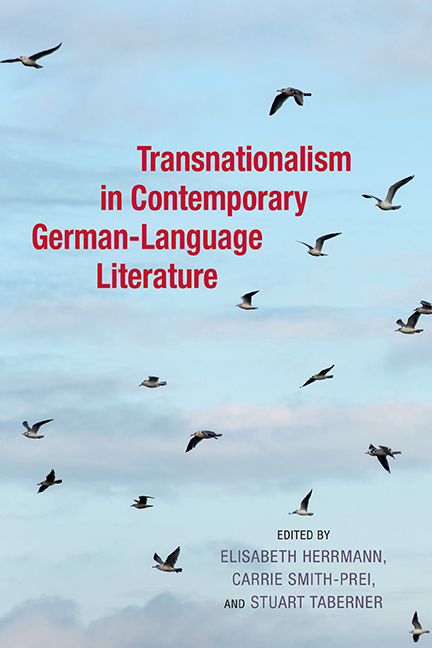9 - Dislocation, Multiplicity, and Transformation: Posttransnationalism in Antje Rávic Strubel's Kältere Schichten der Luft and Vom Dorf
Published online by Cambridge University Press: 10 June 2021
Summary
THOSE WHO ASSOCIATE THE WORK of contemporary German writer Antje Rávic Strubel with transnationalism might have in mind her debut, Offene Blende (Open Aperture, 2001), in which an East German woman reinvents herself in New York City, or award-winning novel Tupolew 134 (Tupolev 134, 2004), the fragmented tale of a plane hijacking between Cold War era Eastern Europe and West Berlin. Strubel's novels are transnational not only because their characters and settings cross, question, and trouble national and cultural boundaries, but also because they participate in the ongoing processes of negotiating contemporary German identities beyond the political borders and bounded histories of the former East and West. This chapter investigates the affinities between the categories of East German and transnational literature and identifies Strubel's novels as engaging in a new posttransnational German project: thematizing the East–West boundary and its dissolution while acknowledging the variety of experiences, affiliations, and narratives that are intertwined with and separated by the border that once divided these now unified nations.
A comparative study of two ostensibly very different books published by Strubel almost two decades after the fall of the wall, Vom Dorf: Abenteuergeschichten zum Fest (From the Village: Adventure Stories for the Holiday, 2007) and Kältere Schichten der Luft (Colder Layers of Air, 2007), locates a shared set of themes and concerns linking narrative indeterminacy with citizenship, mobility, and transformation. Emphasizing the novels’ representations of little brothers, surveillance, and gendered and generational belonging, I argue that these two recent works can be read as transnational in both conventional and innovative ways. This analysis serves as the foundation for my argument for a characterization of postwall East German literature as posttransnational. I propose an interpretation of Strubel's narratives that stresses the trans of transnationalism, demonstrating what such an approach can reveal by examining the interconnections among depictions of transgressions, transformations, and transgenderedness, and the texts’ poignant confrontations with national boundaries and their legacies.
Transnationalism in East German and Postunification Literature
Though Antje Rávic Strubel is a German-born author of German heritage and a native speaker of German, her biography and her literary output qualify her as a quintessentially transnational writer.
- Type
- Chapter
- Information
- Transnationalism in Contemporary German-Language Literature , pp. 187 - 208Publisher: Boydell & BrewerPrint publication year: 2015
- 1
- Cited by



